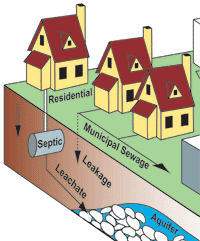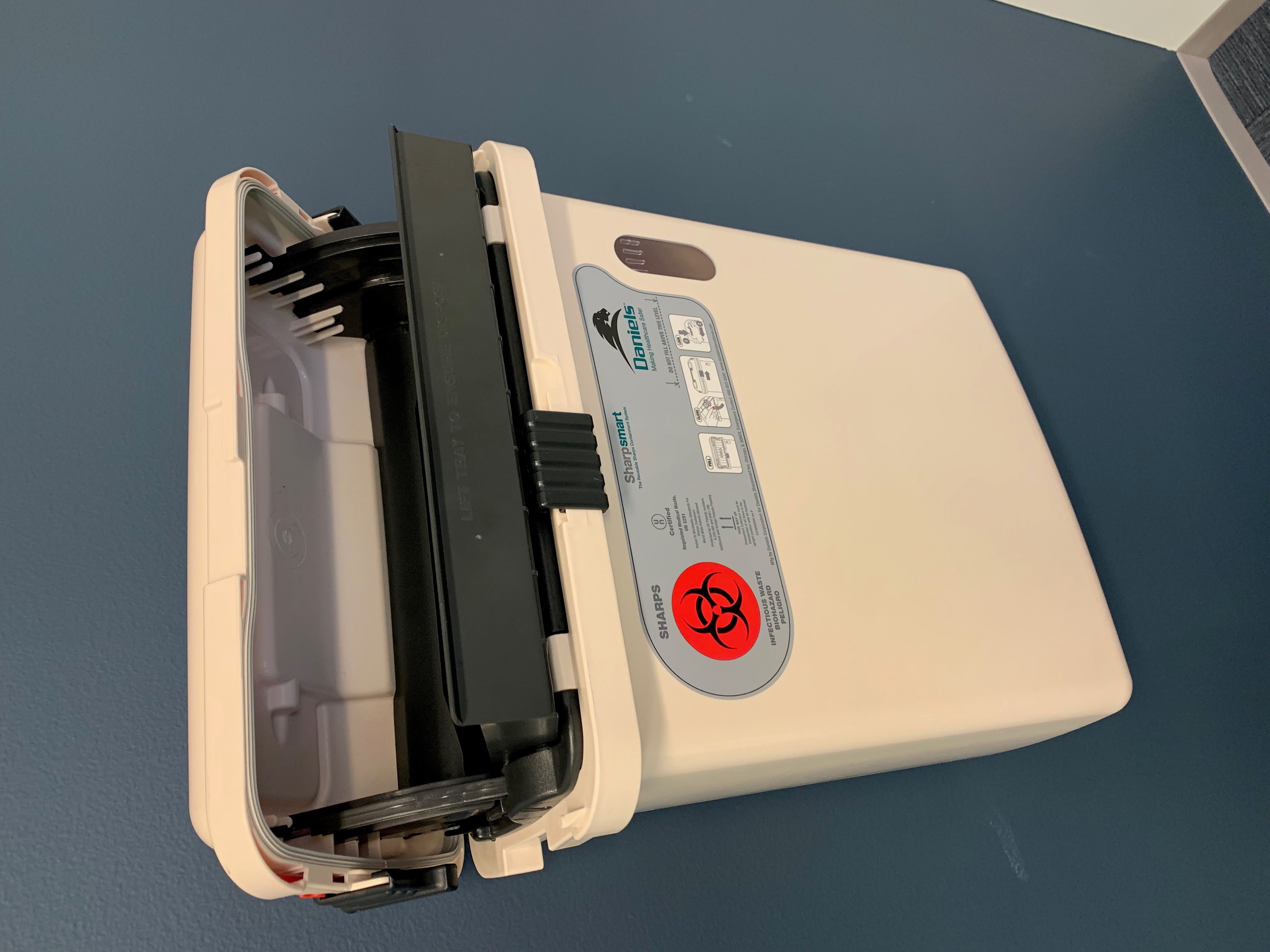|
National Take Back Initiative
The National Take Back Initiative is a voluntary program in the United States, encouraging the public to return excess or expired drugs. The take back events occur twice annually, in the spring and in the fall. The program is coordinated by the Drug Enforcement Administration (DEA). Drug take-back programs are a common and environmentally supportive method for avoiding the improper disposal of unused pharmaceuticals. One of the objectives of the program is to avoid disposal of drugs by flushing them to the local sewage system, which causes water pollution. Municipal sewage treatment plants are not designed to treat pharmaceuticals, and the drugs tend to pass through the plant untreated, to the receiving water body. Background In 2010, according to the Centers for Disease Control and Prevention, enough pharmaceuticals were prescribed to medicate every American adult around-the-clock for one month. Some of these prescriptions and over the counter drugs decay in the home and are highly ... [...More Info...] [...Related Items...] OR: [Wikipedia] [Google] [Baidu] |
Drug Enforcement Administration
The Drug Enforcement Administration (DEA) is a Federal law enforcement in the United States, United States federal law enforcement agency under the U.S. Department of Justice tasked with combating illicit Illegal drug trade, drug trafficking and distribution within the U.S. It is the lead agency for domestic enforcement of the Controlled Substances Act, sharing concurrent jurisdiction with the Federal Bureau of Investigation and U.S. Customs and Border Protection. The DEA is responsible for coordinating and pursuing U.S. drug investigations both domestically and internationally. It was established in 1973 as part of the U.S. government's War on Drugs, war on drugs. The DEA has an DEA Office of National Security Intelligence, intelligence unit that is also a member of the U.S. Intelligence Community. While the unit is part of the DEA chain-of-command, it also reports to the Director of National Intelligence, director of national intelligence. The DEA has been criticized for sche ... [...More Info...] [...Related Items...] OR: [Wikipedia] [Google] [Baidu] |
Water Pollution
Water pollution (or aquatic pollution) is the contamination of Body of water, water bodies, with a negative impact on their uses. It is usually a result of human activities. Water bodies include lakes, rivers, oceans, aquifers, reservoirs and groundwater. Water pollution results when contaminants mix with these water bodies. Contaminants can come from one of four main sources. These are sewage discharges, industrial activities, agricultural activities, and urban runoff including stormwater. Water pollution may affect either surface water or groundwater pollution, groundwater. This form of pollution can lead to many problems. One is the environmental degradation, degradation of aquatic ecosystems. Another is spreading Waterborne diseases, water-borne diseases when people use polluted water for drinking or irrigation. Water pollution also reduces the ecosystem services such as drinking water provided by the Water resources, water resource. Sources of water pollution are either p ... [...More Info...] [...Related Items...] OR: [Wikipedia] [Google] [Baidu] |
Sewage Treatment
Sewage treatment is a type of wastewater treatment which aims to remove contaminants from sewage to produce an effluent that is suitable to discharge to the surrounding environment or an intended reuse application, thereby preventing water pollution from raw sewage discharges. Sewage contains wastewater from households and businesses and possibly pre-treated Industrial wastewater treatment, industrial wastewater. There are a large number of sewage treatment processes to choose from. These can range from Decentralized wastewater system, decentralized systems (including on-site treatment systems) to large centralized systems involving a network of pipes and pump stations (called sewerage) which convey the sewage to a treatment plant. For cities that have a combined sewer, the sewers will also carry urban runoff (stormwater) to the sewage treatment plant. Sewage treatment often involves two main stages, called primary and secondary treatment, while advanced treatment also incorpo ... [...More Info...] [...Related Items...] OR: [Wikipedia] [Google] [Baidu] |
Centers For Disease Control And Prevention
The Centers for Disease Control and Prevention (CDC) is the National public health institutes, national public health agency of the United States. It is a Federal agencies of the United States, United States federal agency under the United States Department of Health and Human Services, Department of Health and Human Services (HHS), and is headquartered in Atlanta, Georgia. The CDC's current nominee for director is Susan Monarez. She became acting director on January 23, 2025, but stepped down on March 24, 2025 when nominated for the director position. On May 14, 2025, Robert F. Kennedy Jr. stated that lawyer Matthew Buzzelli is acting CDC director. However, the CDC web site does not state the acting director's name. The agency's main goal is the protection of public health and safety through the control and prevention of disease, injury, and disability in the US and worldwide. The CDC focuses national attention on developing and applying disease control and prevention. It e ... [...More Info...] [...Related Items...] OR: [Wikipedia] [Google] [Baidu] |
United States Congress
The United States Congress is the legislature, legislative branch of the federal government of the United States. It is a Bicameralism, bicameral legislature, including a Lower house, lower body, the United States House of Representatives, U.S. House of Representatives, and an Upper house, upper body, the United States Senate, U.S. Senate. They both meet in the United States Capitol in Washington, D.C. Members of Congress are chosen through direct election, though vacancies in the Senate may be filled by a Governor (United States), governor's appointment. Congress has a total of 535 voting members, a figure which includes 100 United States senators, senators and 435 List of current members of the United States House of Representatives, representatives; the House of Representatives has 6 additional Non-voting members of the United States House of Representatives, non-voting members. The vice president of the United States, as President of the Senate, has a vote in the Senate ... [...More Info...] [...Related Items...] OR: [Wikipedia] [Google] [Baidu] |
Controlled Substances Act
The Controlled Substances Act (CSA) is the statute establishing federal government of the United States, federal drug policy of the United States, U.S. drug policy under which the manufacture, importation, possession, use, and distribution of certain substances is regulated. It was passed by the 91st United States Congress as Title II of the Comprehensive Drug Abuse Prevention and Control Act of 1970 and signed into law by President Richard Nixon. The Act also served as the national implementing legislation for the Single Convention on Narcotic Drugs. The legislation created five schedules (classifications), with varying qualifications for a substance to be included in each. Two federal agencies, the Drug Enforcement Administration (DEA) and the Food and Drug Administration (FDA), determine which substances are added to or removed from the various schedules, although the statute passed by Congress created the initial listing. Congress has sometimes scheduled other substances t ... [...More Info...] [...Related Items...] OR: [Wikipedia] [Google] [Baidu] |
Barack Obama
Barack Hussein Obama II (born August 4, 1961) is an American politician who was the 44th president of the United States from 2009 to 2017. A member of the Democratic Party, he was the first African American president in American history. Obama previously served as a U.S. senator representing Illinois from 2005 to 2008 and as an Illinois state senator from 1997 to 2004. Born in Honolulu, Hawaii, Obama graduated from Columbia University in 1983 with a Bachelor of Arts degree in political science and later worked as a community organizer in Chicago. In 1988, Obama enrolled in Harvard Law School, where he was the first black president of the ''Harvard Law Review''. He became a civil rights attorney and an academic, teaching constitutional law at the University of Chicago Law School from 1992 to 2004. In 1996, Obama was elected to represent the 13th district in the Illinois Senate, a position he held until 2004, when he successfully ran for the U.S. Senate. In the 2008 pre ... [...More Info...] [...Related Items...] OR: [Wikipedia] [Google] [Baidu] |
Office Of National Drug Control Policy
The Office of National Drug Control Policy (ONDCP) is a component of the Executive Office of the President of the United States. The director of the ONDCP, colloquially known as the drug czar, heads the office. "Drug czar" was a term first used in the media by Richard Nixon in 1971. In addition to running the ONDCP, the director evaluates, coordinates, and oversees both the international and domestic anti-drug efforts of executive branch agencies and ensures that such efforts sustain and complement State and local anti-drug activities. The Director advises the President regarding changes in the organization, management, budgeting, and personnel of federal agencies that affect U.S. anti-drug efforts; and regarding federal agency compliance with their obligations under the National Drug Control Strategy, an annual report required by law. Prior to Rahul Gupta taking office in November, 2021, the most recent director was James. W. Carroll, who took over from former director Michae ... [...More Info...] [...Related Items...] OR: [Wikipedia] [Google] [Baidu] |
Drug Disposal
Drug disposal is the discarding of drugs. Individuals commonly dispose of unused drugs that remain after the end of medical treatment. Health care organizations dispose of drugs on a larger scale for a range of reasons, including having leftover drugs after treating patients and discarding of expired drugs. Failure to properly dispose of drugs creates opportunities for others (of whom the drug is unintended) to take them inappropriately. Inappropriate disposal of drugs can also cause drug pollution. People dispose of drugs in various ways; even organizations with expertise on drugs may give inconsistent information to consumers about drug disposal. Proper waste management system including distribution, control, and disposal not only helps the Healthcare Centres but also promote environmental health. Sources of drugs Medication waste includes both hazardous and non-hazardous waste, controlled substances, and expired pharmaceuticals. Medication waste can come from multiple level ... [...More Info...] [...Related Items...] OR: [Wikipedia] [Google] [Baidu] |
Environmental Impact Of Pharmaceuticals And Personal Care Products
The environmental effect of pharmaceuticals and personal care products (PPCPs) is being investigated since at least the 1990s. PPCPs include substances used by individuals for personal health or Cosmetics, cosmetic reasons and the products used by agribusiness to boost growth or health of livestock. More than twenty million tons of PPCPs are produced every year. The European Union has declared Medication, pharmaceutical residues with the potential of Water pollution, contamination of water and soil to be "priority substances".Environmental impact of pharmaceuticals and personal care products#cite note-WFD2013-2, [3] PPCPs have been detected in water bodies throughout the world. More research is needed to evaluate the risks of toxicity, persistence, and bioaccumulation, but the current state of research shows that personal care products impact the environment and other species, such as coral reefs and fish. PPCPs encompass environmental persistent pharmaceutical pollutants (EPPPs ... [...More Info...] [...Related Items...] OR: [Wikipedia] [Google] [Baidu] |
Medical Waste
Biomedical waste or hospital waste is any kind of waste containing infectious (or potentially infectious) materials generated during the treatment of humans or animals as well as during research involving biologics. It may also include waste associated with the generation of biomedical waste that visually appears to be of medical or laboratory origin (e.g. packaging, unused bandages, infusion kits etc.), as well research laboratory waste containing biomolecules or organisms that are mainly restricted from environmental release. As detailed below, discarded sharps are considered biomedical waste whether they are contaminated or not, due to the possibility of being contaminated with blood and their propensity to cause injury when not properly contained and disposed. Biomedical waste is a type of biowaste. Biomedical waste may be solid or liquid. Examples of infectious waste include discarded blood, sharps, unwanted microbiological cultures and stocks, identifiable body parts (incl ... [...More Info...] [...Related Items...] OR: [Wikipedia] [Google] [Baidu] |







